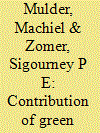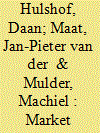|
|
|
Sort Order |
|
|
|
Items / Page
|
|
|
|
|
|
|
| Srl | Item |
| 1 |
ID:
149934


|
|
|
|
|
| Summary/Abstract |
In European countries, retailers are obliged to disclose the energy source and the related environmental impacts of their portfolio over the preceding year. The electricity supplied in the Dutch retail market is presented as renewable energy for 34%, but this relatively high share is for 69% based on certificates (Guarantees of Origin) which are imported from in particular Norway. The certificates are used to sell green electricity to consumers. The premium for green electricity which is actually paid by Dutch consumers is no more than a few percentages of the retail price. The low level of this premium is related to the abundant supply of certificates at low marginal costs from Norway. This also means that the premium for green electricity is too low to give an incentive for investments in new capacity. Hence, the current labelling system for renewable electricity is mainly valuable, besides being an instrument for tracking and tracing of renewable energy, as a marketing instrument for electricity retailers. The effectiveness of Guarantees of Origin as a policy instrument to foster renewable electricity sources is weak. This effectiveness can be raised by implementing restrictions on the international trade or the issuance of new certificates.
|
|
|
|
|
|
|
|
|
|
|
|
|
|
|
|
| 2 |
ID:
166306


|
|
|
|
|
| Summary/Abstract |
This paper examines market structure, regulation, and market performance of the Dutch electricity retail market for households since its opening in 2004. Using data containing monthly prices for all products offered in the Dutch retail electricity markets over the period 2008–2014, we provide quantitative results on the intensity of retail competition and the benefits to consumers. Regulation of the retail electricity market is relatively intensive and encompasses structural measures, contractual restrictions, rules on information provision, price surveillance and market monitoring. In contrast to most other countries, the Dutch regulation includes a kind of price regulation which is that the regulator surveys all new retail prices before market introduction in order to prevent too high retail prices. The Dutch retail electricity market has remained relatively concentrated, with retailers offering an increasing variety of retail products, often using multiple brands. Competition is characterized by product innovation, especially for green energy, rather than price competition on homogenous products. Gross retail margins remain relatively high, as is price dispersion across retailers. The market matured, as evidenced by fewer consumer complaints and higher switching rates.
|
|
|
|
|
|
|
|
|
|
|
|
|
|
|
|
| 3 |
ID:
150622


|
|
|
|
|
| Summary/Abstract |
After the liberalisation of the gas industry, trading hubs have emerged in Europe. Although these hubs appear to be liquid market places fostering gas-to-gas competition, the efficiency of the gas market remains a topic of interest as a fair share of gas is still traded through long-term contracts with prices linked to the oil price while the number of gas suppliers to the European market is limited. In order to assess the efficiency of the gas market, we analyse the day-ahead spot price at the Dutch gas hub over the period 2011–2014. We find that the oil price had a small positive impact on the gas price. Changes in the concentration on the supply side did not affect the movement in gas prices. The availability of gas in storages and the outside temperature negatively influenced the gas price. We also find that the gas price was related to the production of wind electricity. Overall, we conclude that the day-ahead gas prices are predominantly determined by gas-market fundamentals. Policies to further integrate gas markets within Europe may extend this gas-to-gas competition to a larger region.
|
|
|
|
|
|
|
|
|
|
|
|
|
|
|
|
|
|
|
|
|